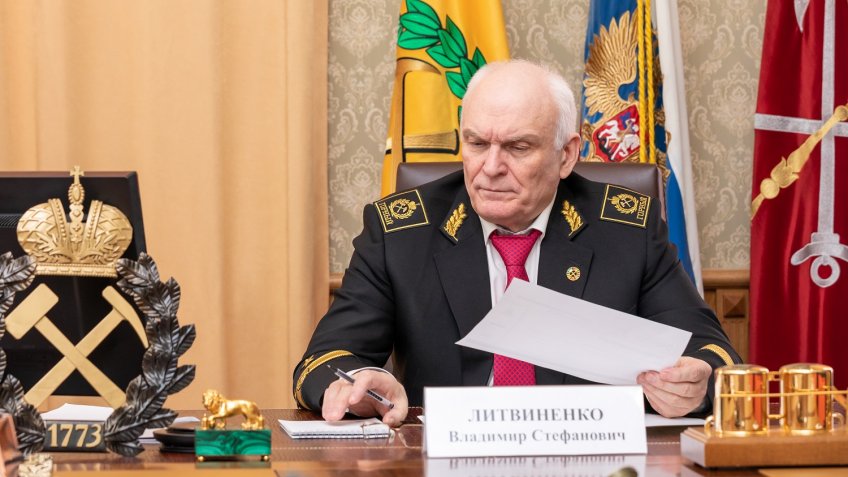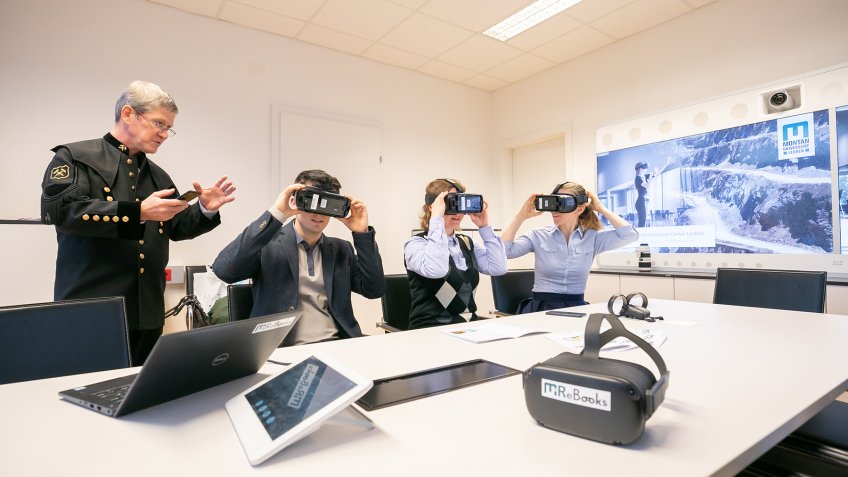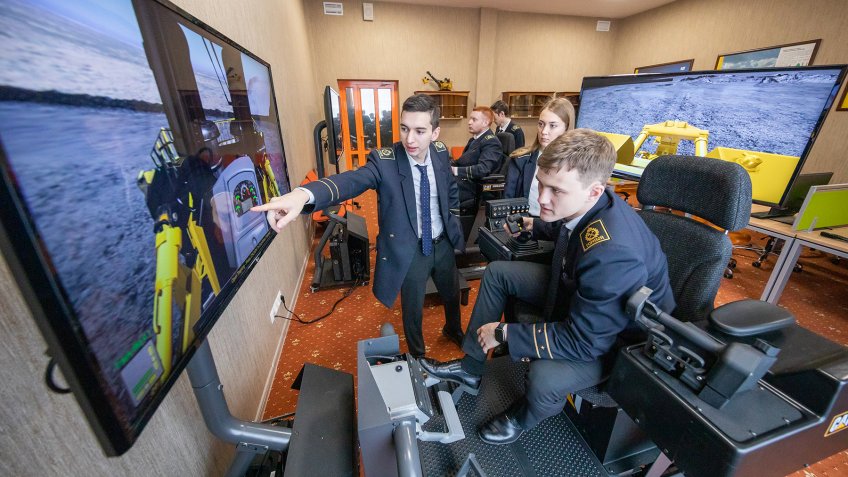
This year's admission campaign at Russian universities is taking place both online and on-site. So it is possible to send in the documents for admission either in person or online. However, this has had almost zero impact on the activity of applicants and their preferences. The most popular professions amongst youth are, as before, IT workers, doctors, lawyers, and engineers. We asked Vladimir Litvinenko, Rector of St. Petersburg Mining University, about the efforts higher education institutions are making to create a positive educational environment, improve the competency of its graduates and the quality of scientific research.
Mr Litvinenko, the front entrance to the Mining University, through which undergraduate applicants and their parents get inside the building, looks, as always, solemn. But if you advance further on, it seems as if you have made it onto a vast construction site. Is this how it happens every summer?
Litvinenko: Each year, we spend an enormous amount of money to renovate our properties. It is primarily thanks to these financial injections that we manage to retain our high position in the global rankings of mining-engineering universities. After all, competent staff alone is not enough to meet the highest international scientific & educational standards. There has to be a scientific-educational environment, too, which, in turn, obligates to make modern architectural and planning solutions.
Over the past ten years, we have built more than 120,000 square metres of new areas, reconstructed 160,000 square metres. These are classrooms, halls, laboratories with the most sophisticated scientific equipment, and also dormitories where the students live. Our goal is to provide them with comfortable conditions allowing both to study and recreate. We are now building yet another, the tenth dormitory, which can fit 650 people, and constructing a new educational & research centre on the shore of the Black Sea. The latter will house a geological training facility. Therein will be as well a residential building, capable of accommodating over 400 people.
Facilities and resources per se won't suffice to graduate a qualified specialist demanded by the labour market. We need to give young people an opportunity to acquire and develop professional competencies. Hence, our students immerse themselves into a competitive landscape the very first day they begin their studies.
The best of the students enjoy the best possible conditions; they also rank higher in the lists of candidates for foreign exchange programmes. What prospects does this offer? For example, they can obtain a degree certificate from a European university, in addition to the one from their alma mater. They can go abroad for an internship at one of our partner universities or undertake a work placement at one of Russia's flagship enterprises. These are oil & gas and mining companies, such as, for instance, PhosAgro, Rosneft, Gazprom, Novatek, Russian Copper Company. Therefore our graduates have a competitive edge that enables them to unlock their creative potential and, ultimately, become financially self-sufficient people who practise a profession they genuinely like. In short, competition drives the quality of education.
You are talking about professional competencies here. And what about traditional learning activities?
Litvinenko: It is a dynamic process. They go hand in hand with professional competencies, which all students should master. Lectures, laboratory and practical work, summer schools, workshops, proficiency in foreign languages, field experience — these are links in one chain. When preparing a graduation thesis, it is essential to think of how to present it. Knowing how to work with field-specific software in user mode is necessary too. Finally, the learning process should incorporate digital technologies, which must occupy up to 30% of class time. Progress is progress. It urges to make amendments to curricula, alter practical activities. Teacher-student interaction is going through a change as well.
As of now, what role does science play at the university?
Litvinenko: Science is our priority. Teachers who don't take part in research projects can't have high professional competency. And if they lack competency, we can't hire them as regular teachers. From next year onwards, we are imposing more stringent requirements. It means that, for example, a doctor of sciences (habilitated) shall be doing laboratory research and publish no fewer than two articles a year in first- and second-quartile scientific journals. At the same time, the number of citations per such publication shall not be lower than ten cites in the previous three years. The norms are slightly more lenient for a candidate of sciences (research doctorate), with one scientific paper per year and the same number of citations per article.
Science is an experiment carried out with high fidelity and quality of measurement. It ends with a scientific result, which takes the form of an article, report, or thesis paper. Citedness in a high-impact journal indicates that the conducted experiment is a top-level one, and it has brought a scientific result.
To achieve this, one would need a basis for performing research and introducing it into actual production. I am referring here to research centres, offering the most advanced equipment and generating an appropriate environment. There are currently five of them at the university, each of which ensures the involvement of research staff members from the relevant departments in the scientific process. So basically, all of the scientific employees take part, and their task is to engage the teaching staff, along with PhD students and researchers who are dealing with similar subject matters.
Are youth seeing themselves working in science?
Litvinenko: We aim to show them that science is fascinating. Youngsters are the future; they will make up the world's talent pool, and the university is highly interested in expanding and developing it. The costs are tremendous, especially if we are talking about PhD studies. Nevertheless, we know why we are doing it, so we keep investing in postgraduates. The percentage of students who successfully defend their PhD theses is growing year on year and has already exceeded 60%. We see it as a consequence of the strategic work the university is carrying out together with the world's best scholarly venues, and that has started to pay off. Most importantly, postgraduate students position themselves as researchers and are aware that they must possess research and educational skills and have proficiency in a foreign language.
All the things that you have mentioned require significant investment. So how does the university ensure a decent academic and social environment and a comfortable setting for its students?
Litvinenko: We receive as much public funding as most other technical universities get. But these funds, unfortunately, are not sufficient to ensure the proper functioning of educational institutions. Some 7,000 of our students are partially funding their studies through the help of PhosAgro and several of its shareholders. It is a lot — the company pays more than 200,000 roubles a year per student. It also allocates nine mln roubles for four-year-long studies of each PhD student, and this comes in addition to the funds from the state budget. Other companies, such as Rosneft, Russian Copper Company, Gazprom, Titan, are co-financing and supporting the studies of 800 undergraduates. Last year, Uralkali helped fund the higher education of about 400 students from the Ural region. The role of these special-purpose funds in the development of the university is invaluable.
I would mention here that we often tend to perceive business from a consumer's point of view and see flagship companies as ordinary employers at best. Yet, they are the backbone of the national economy, which ensures the country's progressive socio-economic development and, in particular, that of higher education. It is partner companies that enable universities to improve the quality of the scientific and educational environment, be on par with the world's leading universities. Our undergraduate and postgraduate students consider it very important. That is true statesmanship!
The companies in question invest in young hopefuls and personally participate in the university's activities — without any fuss. Our main partners are PhosAgro, Rosneft, Gazprom, Russian Copper Company, Titan, Caterpillar, Schneider Electric, Orica, Total, Marubeni.
St. Petersburg Mining University has hit the top-20 of the world university rankings by subject "Mineral and Mining Engineering" for the fourth year in a row. The British-based QS ranking agency compiles the list consisting of 920 mining-engineering universities located anywhere in the world. No other Russian higher educational institution has ever accomplished such an impressive feat — an outcome that wouldn't be possible had it not been for the joint efforts of our research and teaching staff and our business partners.









